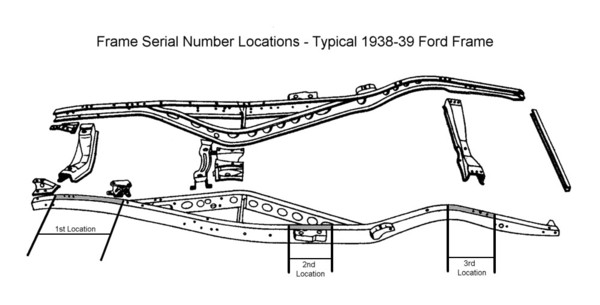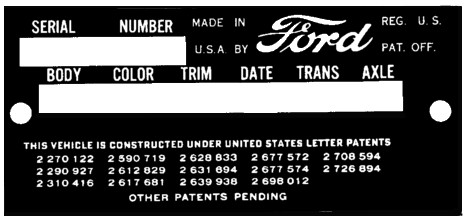| Model
Year |
Make
and Engine |
Passenger
Car Model (note a) |
First
Serial Number
(See note B below) |
| 1932 |
V8 |
18 |
18-
001 to 18- 203,126 |
| 1933 |
V8 |
40 |
18- 203,127 to 18-
457,477 |
| 1934 |
V8 |
40 |
18- 457,478 to 18-1,234,356 |
| 1935 |
V8 |
48 |
18-1,234,357 to 18-2,207,110 |
| 1936 |
Ford V8
Linc-Zephyr V12 |
68
901 |
18-2,207,111 to 18-3,331,856
H-1
to H-15,549 |
| 1937 |
Ford V8 - 60hp
Ford V8 - 85hp
Linc-Zephyr V12 |
74
78
HB |
54- 6,602
to 54- 358,334
18-3,331,857 to 18-4,186,446
H-15,550 to
H-45,529 |
| 1938 |
Ford V8 - 60hp
Ford V8 - 85hp
Linc-Zephyr V12 |
82A
81A
86H |
54- 358,335
18-4,186,447 to 18-4,661,000
(f)
H-45,530
to H-64,640 |
| 1939 |
Ford V8 - 60hp
Ford V8 - 85hp
Mercury V8 - 90hp
Linc-Zephyr V12 |
922A
91A
99A
96H |
Continued
from 1938 to 54-506,500
(d)
18-4,661,001 to 18-5,210,700
(e)
99- 001 to
99-101,700
H-64,641
to H-85,640 |
| 1940 |
Ford V8 - 60hp
Ford V8 - 85hp
Mercury V8 - 90hp
Linc-Zephyr V12 |
022A
01A
09A
06H |
54-0,506,501
to end
(g)
18-5,210,701 to 18-5,896,294
99A-101,701 to 99A-257,100
H-85,641
to H-107,687 |
| 1941 |
Ford V8 - 90hp
Ford 6 - 90hp
Mercury V8 - 95hp
Linc-Zephyr V12 |
11A
1GA
19A
16H |
18-5,896,295 to 18-6,769,035
1GA-000,001 to 1GA-034,800
99A-257,101 to 99A-466,700
H-107,688 to
H-129,690 |
| 1942 |
Ford V8 - 90hp
Ford 6 - 90hp
Mercury V8 - 100hp
Linc-Zephyr V12 |
21A
2GA
29A
26H |
18-6,769,036 to 18-6,925,898
1GA-034,801 to 1GA-227,523
99A-466,701 to 99A-
H-129,691 to H-136,254 |
| 1946 |
Ford V8 - 100hp
Ford 6 - 90hp
Mercury V8 - 100hp
Lincoln V12 |
69A
6GA
69M
66H |
99A-650,280 to 99A-1,412,709
1GA-227,524 to 1GA- 326,417
99A-650,280 to 99A-1,412,709
H-136,255 to
H-152,839
(k) |
| 1947 |
Ford V8 - 100hp
Mercury V8 - 100hp
Ford 6 - 90hp (G)
Ford 6 - 90hp (H)
Lincoln V12 |
79A
79M
7GA
----
76H
|
799A-1,412,708 to 799A-2,071,117
(i)
799A-1,412,708 to 799A-2,071,117
71GA- 326,418 to 71GA- 414,366
77HA- 0,512 to
77HA- 9,038
(c)
7H-152,840
to 7H-174,289 |
| 1948 |
Ford V8 - 100hp
Ford 6 - 90hp
Mercury V8 - 100hp
Lincoln V12 |
89A
8GA
89M
|
899A-2,071,118 to 899A-2,374,315
87HA- 0,536 to
87HA- 073,901
(i)
899A-2,005,028 to 899A-2,374,315
8H-174,290
to 8H- |
| 1949 |
Ford V8 - 100hp
Ford 6 - 95hp
Mercury V8 - 110hp |
8BA
8HA
9CM
|
98BA-101
98HA-101
9CM -101 |
| 1950 |
Ford V8 - 100hp
Ford 6 - 95hp
Mercury V8 - |
0BA
0HA
0CM
|
B0-100,001
(J)
H0-100,001
50-100,001M |
| 1951 |
Ford V8 - 100hp
Ford 6 - 95hp
Mercury V8 - |
1BA
1HA
1CM
|
B1-100,001
(J)
H1-100,001
51-100,001M |
| 1952 |
Ford V8 - 110hp
Ford 6 - 101hp
Mercury V8 - |
B2
A2
(All) |
A2-100,001
(J)
B2-100,001
52-100,001M |
| 1953 |
Ford V8 - 110hp
Ford 6 - 101hp
Mercury V8 - |
B3
A3
(All)
|
A3-100,001
(J)
B3-100,001
53- 5,001H |
|

